Soundboard — The Heart of the Piano
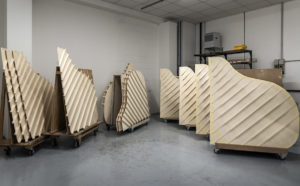 The ultimate goal of a piano soundboard is to maintain the full richness of the vibrations generated by the strings, gradually converting them into sound waves which are propagated efficiently through the surrounding air.
The ultimate goal of a piano soundboard is to maintain the full richness of the vibrations generated by the strings, gradually converting them into sound waves which are propagated efficiently through the surrounding air.
The soundboard is formed of planks 11 mm thick and with a width varying between 8 and 12 cm. These are glued edge to edge, forming a thin “diaphragm” that is very mobile and offers a large surface area.
Ribs are glued to the underside (flexible wooden strips shaped so that they are rigid at the centre and more flexible at the ends), perpendicular to the grain of the soundboard, giving them greater uniformity and a slight upward curvature.
Then, the mid-upper and bass bridges are glued in place, which transfer the vibrations from the strings to the soundboard.
The soundboard must react uniformly to the vibrations of the strings, absorbing energy gradually and converting it into sound.
A soundboard with too much mobility may create explosive notes in terms of attack, but they will have a short duration.
However, going too far the other way, restricting its mobility, will create a sound that is too weak. A perfect balance is required that allows the soundboard to amplify the vibrations from the strings whilst maintaining good duration (known as “sustain”) and also guaranteeing sufficient harmonic richness and power (when the pianist desires it). The soundboard must also guarantee sufficient strength to withstand the static vertical load exerted by the strings tensioned on the bridge, along with stability of form (e.g. curvature), reacting as little as possible to changes in humidity and temperature, allowing stable tuning of the piano.
Fazioli has dedicated a significant portion of its research to the optimization of the soundboard, and patenting innovative solutions for its creation.
The soundboard made with a special structure featuring three crossed layers of wood and a thickness of micrometres represents an important step towards achieving a solution with more uniform acoustic response and even greater stability over time, as well as under extreme environmental conditions (e.g. very dry or very humid environments).
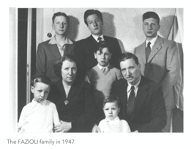 The founder Paolo Fazioli was born in Rome in 1944, into a family of furniture makers. From a very early age he demonstrated a gift for music and a keen interest in the piano. He consequently started taking piano lessons and continued his piano studies through his high school and university years, during which he developed a keen interest in the piano construction technology. He broadened his knowledge through visiting manufacturing and restoration workshops and reading the most authoritative literature on the subject.
The founder Paolo Fazioli was born in Rome in 1944, into a family of furniture makers. From a very early age he demonstrated a gift for music and a keen interest in the piano. He consequently started taking piano lessons and continued his piano studies through his high school and university years, during which he developed a keen interest in the piano construction technology. He broadened his knowledge through visiting manufacturing and restoration workshops and reading the most authoritative literature on the subject.
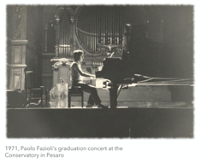 In 1969, he graduated from the University of Rome with a degree in Mechanical Engineering and in 1971 he received a degree in piano performance from the G. Rossini Conservatory in Pesaro, under the guidance of Maestro Sergio Cafaro. At the same time, he earned a Master’s degree in Music Composition at the St Cecilia Academy in Rome, where he studied under the composer Boris Porena.
In 1969, he graduated from the University of Rome with a degree in Mechanical Engineering and in 1971 he received a degree in piano performance from the G. Rossini Conservatory in Pesaro, under the guidance of Maestro Sergio Cafaro. At the same time, he earned a Master’s degree in Music Composition at the St Cecilia Academy in Rome, where he studied under the composer Boris Porena.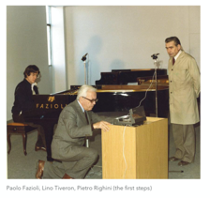 The first prototype F183 model completed in June 1980, followed at the end of the year by the prototypes of two other models, the F156 and the F278. In January 1981, Fazioli Pianoforti was officially incorporated. In 1982, all four models – the F156, F183, F228 and F278 were exhibited at the Frankfurt Musikmesse. The prototype of the first F308 received its first public performance in 1987, at the Teatro Comunale in Monfalcone, with French pianist François Joël Thioller performing both Tchaikovsky piano concertos.
The first prototype F183 model completed in June 1980, followed at the end of the year by the prototypes of two other models, the F156 and the F278. In January 1981, Fazioli Pianoforti was officially incorporated. In 1982, all four models – the F156, F183, F228 and F278 were exhibited at the Frankfurt Musikmesse. The prototype of the first F308 received its first public performance in 1987, at the Teatro Comunale in Monfalcone, with French pianist François Joël Thioller performing both Tchaikovsky piano concertos. The ultimate goal of a piano soundboard is to maintain the full richness of the vibrations generated by the strings, gradually converting them into sound waves which are propagated efficiently through the surrounding air.
The ultimate goal of a piano soundboard is to maintain the full richness of the vibrations generated by the strings, gradually converting them into sound waves which are propagated efficiently through the surrounding air.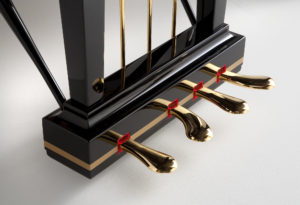 Concert grand. The absolute “jewel in the crown” designed for modern large-capacity concert halls and vast spaces. It has immense power and extraordinary harmonic richness, owing to the increased string length in the bass section. It is endowed with a fourth pedal invented by Fazioli. Located to the left of the three traditional pedals, it reduces the hammer-blow distance thus reducing the volume without modifying the timbre, at the same time facilitating the performance of glissandos, pianissimos, rapid passages, and legatos.
Concert grand. The absolute “jewel in the crown” designed for modern large-capacity concert halls and vast spaces. It has immense power and extraordinary harmonic richness, owing to the increased string length in the bass section. It is endowed with a fourth pedal invented by Fazioli. Located to the left of the three traditional pedals, it reduces the hammer-blow distance thus reducing the volume without modifying the timbre, at the same time facilitating the performance of glissandos, pianissimos, rapid passages, and legatos.